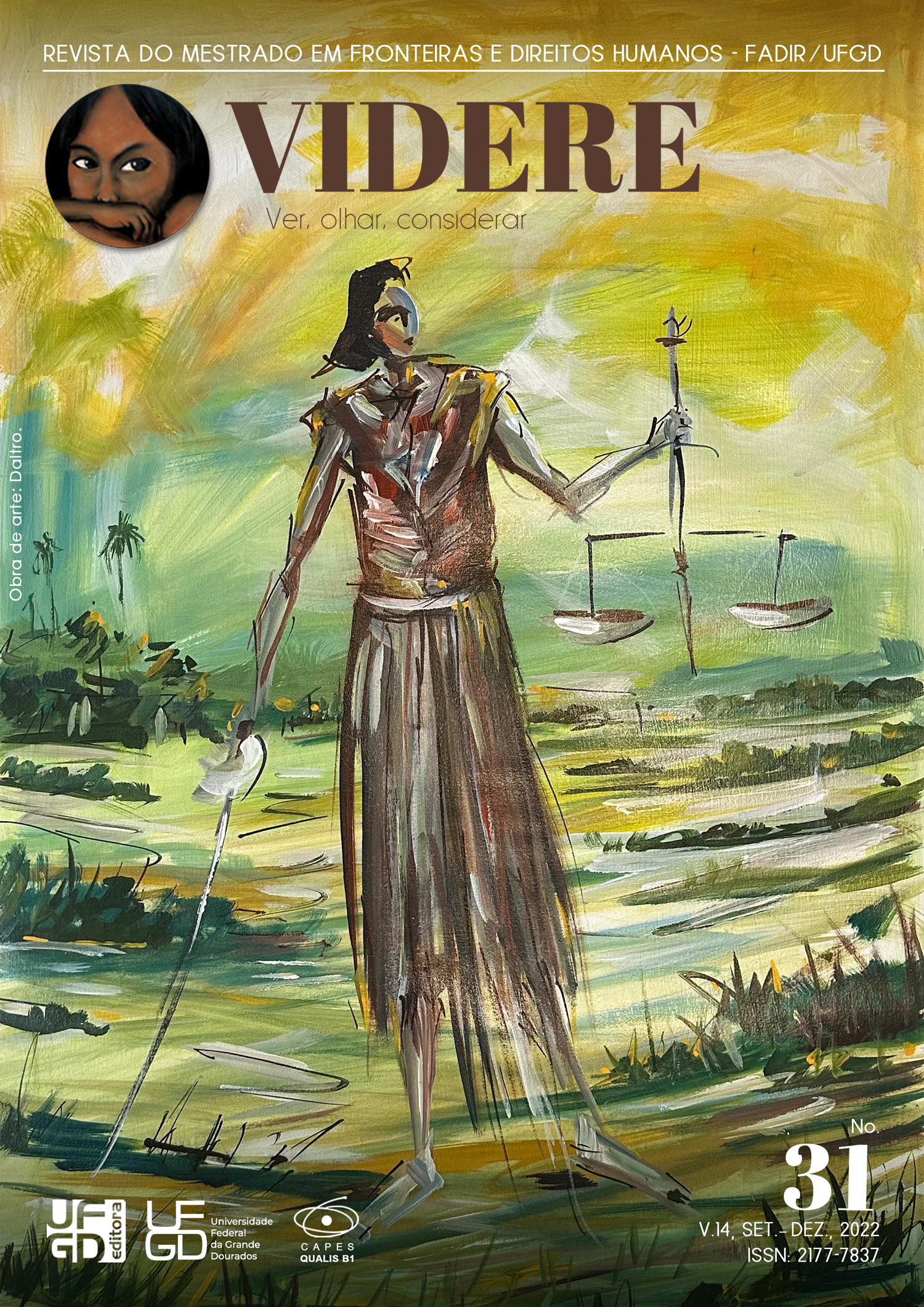TAXATION 4.0 AND THE SUSTAINABILITY OF THE BRAZILIAN SOCIAL SECURITY SYSTEM
DOI:
https://doi.org/10.30612/videre.v14i31.15557Keywords:
4.0 Revolution, Social security, 4.0 taxation, Welfare stateAbstract
The State's tax system is its base source of funding. This system, modernly, needs to meet not only the State's regular expenses, but to sustain public policies that aim at the population's well-being and quality of life. Within these aspects, this system must satisfactorily fund the social security system. Meanwhile, modernity, embodied in globalization and virtualization, has brought the 4.0 revolution in industry and commerce, which has impacted the traditional tax system that can keep up with this evolution. Following this line, in a literature and legislation review, observing the exploratory descriptive methodology, this research aims to analyze the taxation 4.0 and the social security contribution of companies on the payroll, especially in its exoneration. It intends to demonstrate the need for tax reform, within the field of taxation 4.0, to help maintain the funding of the social security system, without burdening or overloading companies.
Downloads
References
ABINEE - Associação Brasileira da Indústria Elétrica e Eletrônica. Proposta para a Inserção do Brasil na 4ª Revolução Industrial. São Paulo, jun. 2018. Disponível em: http://www.ipdeletron.org.br/wwwroot/pdf-publicacoes/56/Proposta_Abinee___Insercao_do_Brasil_4_Rev_Ind.pdf. Acesso em: 20 jan. 2022.
AMORIM, J. E. A “indústria 4.0” e a sustentabilidade do modelo de financiamento do Regime geral de segurança social. Caderno de Direito Actual, n. 5, volume extraordinário. Porto: Universidade do Porto, 2017.
ARRETCHE, M. T. S. Emergência e desenvolvimento do Welfare State: Teorias explicativas. In: DELGADO, M. G.; PORTO, L. V. Welfare State: os grandes desafios do estado do bem-estar. São Paulo: LTr, 2019.
BECK, U. A reinvenção da política: rumo a uma teoria da modernização reflexiva. In: BECK, U.; GIDDENS, A.; LASH, S. Modernização reflexiva. São Paulo: Unesp, 1997.
BOUVIER, M. Introduction au droit fiscal général et à la théorie de l’impôt. 10. ed. Paris: LGDJ, 2010.
BRASIL. Superior Tribunal de Justiça Recurso Especial n. 1.230.957/RS. Relator Ministro Mauro Campbell Marques, 26 fev. 2014. Diário da Justiça [da] República Federativa do Brasil, Brasília, 18 mar. 2014.
BRASIL. Supremo Tribunal Federal. Recurso Extraordinário n. 576.967. Relator Ministro Luiz Roberto Barroso, 5 ago. 2020. Diário da Justiça [da] República Federativa do Brasil, Brasília, 21 out. 2020.
CARDOSO, D. F. Capital e trabalho no Brasil no século XXI. O impacto de transferência e de tributação sobre desigualdade, consumo e estrutura produtiva. Tese (Doutorado em Economia). 2016. 270 fls. Belo Horizonte, UFMG, 2016. Disponível em: https://repositorio.ufmg.br/bitstream/1843/FACE-ADBJPP/1/tese_deborafreirecardoso.pdf. Acesso em: 17 jan. 2022.
CORREIA NETO, C. de B.; AFONSO, J. R. R.; FUCK, L. F. A Tributação na Era Digital e os Desafios do Sistema Tributário no Brasil. Revista Brasileira de Direito, Passo Fundo, v. 15, n. 1, p. 145-167, jan.-abr./2019. doi: https://doi.org/10.18256/2238-0604.2019.v15i1.3356.
GALBRAITH, J. K. O Pensamento Econômico em Perspectiva: uma história crítica. São Paulo: Editora da Universidade de São Paulo, 1989.
GIDDENS, A. Mundo em descontrole: o que a globalização está fazendo de nós. 6. ed. Rio de Janeiro: Record, 2007.
GIL, A. C. Métodos e técnicas de pesquisa social. 5. ed. São Paulo: Atlas, 1999.
HARVEY, D. O enigma do capital: e as crises do capitalismo. São Paulo: Boitempo, 2011.
LEADBEATER, C. The rise of the social entrepreneur. Londres: Demos, 1997.
OHMAE, K. O fim do estado nação: a ascensão das economias regionais. Rio de Janeiro: Campus, 1996.
PIKETTY, T. O Capital no Século XXI. Rio de Janeiro: Intrínseca, 2014.
REZENDE, F. A revolução digital e a reforma tributária. In: AFONSO, J. R. R.; SANTANA, H. L. (coord.). Tributação 4.0. São Paulo: Almedina, 2020.
SCHUMPETER, J. A. Capitalismo, Socialismo e Democracia. Rio de Janeiro: Fundo de cultura, 1961.
SELLTIZ; JAHODA; DEUTSCH; COOK. Métodos de pesquisa nas relações sociais. São Paulo: USP, 1974.
SOUZA, J. Oportunidades fiscais e tributárias na Indústria 4.0, 20 jul. 2018. Disponível em: https://cio.com.br/tendencias/oportunidades-fiscais-e-tributarias-na-industria-40/. Acesso em: 20 jan. 2022.
STEWART, M. New Research on Tax Law and Political Institutions. Law in Context, v. 24, n. 2, 2006. U of Melbourne Legal Studies Research Paper, n. 219. p. 1-9, p. 1. Disponível em: https://papers.ssrn.com/sol3/papers.cfm?abstract_id=978709. Acesso em: 13 jan. 2022.
TANZI, V. A taxação do futuro da proteção social. In: GIDDENS, A. (Org.). O debate global da terceira via. São Paulo: UNESP, 2007.
TEIXEIRA, G. Manual de Direito Fiscal. 3. ed. Coimbra: Almedina, 2015.
TORRES, R. L. A ideia de liberdade no estado patrimonial e no estado fiscal. Rio de Janeiro: Renovar, 1991.
Downloads
Published
How to Cite
Issue
Section
License
Copyright (c) 2023 Revista Videre

This work is licensed under a Creative Commons Attribution-NonCommercial-ShareAlike 3.0 Unported License.
Authors must accept the publication rules when submitting the journal, as well as agree to the following terms:
(a) The Editorial Board reserves the right to make changes to the Portuguese language in the originals to maintain the cultured standard of the language, while respecting the style of the authors.
(b) Authors retain the copyright and grant the journal the right to first publication, with the work simultaneously licensed under the Attribution-NonCommercial-ShareAlike 3.0 Brazil (CC BY-NC-SA 3.0 BR) that allows: Share - copy and redistribute the material in any medium or format and Adapt - remix, transform, and create from the material. CC BY-NC-SA 3.0 BR considers the following terms:
- Attribution - You must give the appropriate credit, provide a link to the license and indicate whether changes have been made. You must do so under any reasonable circumstances, but in no way that would suggest that the licensor supports you or your use.
- NonCommercial - You may not use the material for commercial purposes.
- Sharing - If you remix, transform, or create from material, you must distribute your contributions under the same license as the original.
- No additional restrictions - You may not apply legal terms or technological measures that legally restrict others from doing anything that the license permits.
(c) After publication, authors are allowed and encouraged to publish and distribute their work online - in institutional repositories, personal page, social network or other scientific dissemination sites, as long as the publication is not for commercial purposes.



















